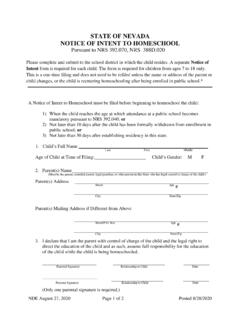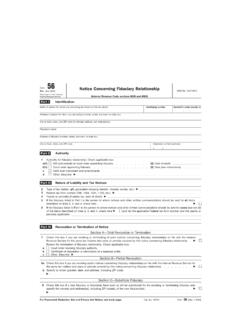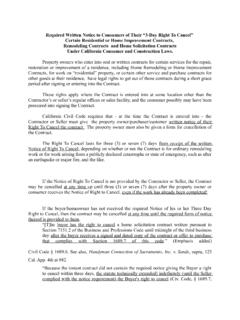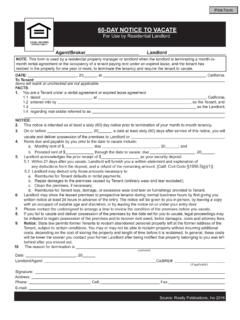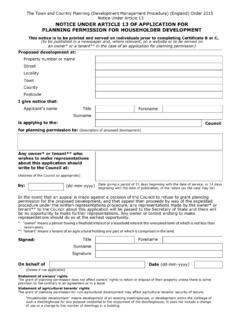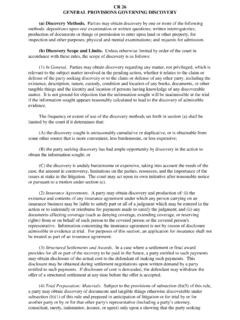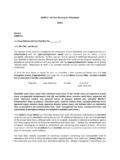Transcription of COVID-19 GUIDANCE UNDER § 125 CAFETERIA PLANS AND …
1 COVID-19 GUIDANCE UNDER 125 CAFETERIA PLANS AND RELATED TO HIGH DEDUCTIBLE HEALTH PLANS notice 2020-29 I. PURPOSE AND OVERVIEW To assist with the nation s response to the 2019 Novel Coronavirus outbreak ( COVID-19 ), this notice provides for increased flexibility with respect to mid-year elections UNDER a 125 CAFETERIA plan during calendar year 2020 related to employer-sponsored health coverage, health Flexible Spending Arrangements (health FSAs), and dependent care assistance programs. This notice also provides increased flexibility with respect to grace periods to apply unused amounts in health FSAs to medical care expenses incurred through December 31, 2020, and unused amounts in dependent care assistance programs to dependent care expenses incurred through December 31, 2020.
2 As described more fully below, this notice provides that For mid-year elections made during calendar year 2020, a 125 CAFETERIA plan may permit employees who are eligible to make salary reduction contributions UNDER the plan to: (1) with respect to employer-sponsored health coverage, (a) make a new election on a prospective basis, if the employee initially declined to elect employer-sponsored health coverage; (b) revoke an existing election and make a new election to enroll in different health coverage sponsored by the same employer on a prospective basis; 2 and (c) revoke an existing election on a prospective basis, provided that the employee attests in writing that the employee is enrolled, or immediately will enroll, in other health coverage not sponsored by the employer; (2) revoke an election, make a new election, or decrease or increase an existing election applicable to a health FSA on a prospective basis.
3 And (3) revoke an election, make a new election, or decrease or increase an existing election regarding a dependent care assistance program on a prospective basis; For unused amounts remaining in a health FSA or a dependent care assistance program UNDER the 125 CAFETERIA plan as of the end of a grace period or plan year ending in 2020, a 125 CAFETERIA plan may permit employees to apply those unused amounts to pay or reimburse medical care expenses or dependent care expenses, respectively, incurred through December 31, 2020.
4 And The relief provided in notice 2020-15, 2020-14 IRB 559 regarding high deductible health PLANS (HDHPs) and expenses related to COVID-19 , and in section 3701 of the Coronavirus Aid, Relief, and Economic Security Act (CARES Act) ( 116-136, 134 Stat. 281 (March 27, 2020)) regarding an exemption for telehealth services, may be applied retroactively to January 1, 2020. II. BACKGROUND A. Elections UNDER a 125 CAFETERIA Plan Section 125(d)(1) of the Internal Revenue Code (Code) defines a 125 CAFETERIA plan as a written plan maintained by an employer UNDER which all participants are 3 employees, and all participants may choose among two or more benefits consisting of cash and qualified benefits.
5 Subject to certain exceptions, 125(f) defines a qualified benefit as any benefit which, with the application of 125(a), is not includable in the gross income of the employee by reason of an express provision of the Code. Qualified benefits that may be provided UNDER a 125 CAFETERIA plan include employer-provided accident and health PLANS excludable UNDER 106 and 105(b), health FSAs excludable UNDER 106 and 105(b), and dependent care assistance programs excludable UNDER 129. Elections regarding qualified benefits UNDER a 125 CAFETERIA plan generally must be irrevocable and must be made prior to the first day of the plan year, except as provided UNDER Treas.
6 Reg. Treas. Reg. provides that a 125 CAFETERIA plan may permit an employee to revoke an election during a period of coverage and to make a new election UNDER certain circumstances, such as if the employee experiences a change in status or there are significant changes in the cost of coverage. Section 125 does not require a 125 CAFETERIA plan to permit the mid-year election changes allowed UNDER Treas. Reg. Due to the nature of the public health emergency posed by COVID-19 and unanticipated changes in the need for medical care, some employers have indicated a willingness to offer employees who initially declined to elect employer-sponsored health coverage an opportunity to elect health coverage or allow employees enrolled in 1 In contrast, for qualified transportation fringe benefits UNDER 132(f) (which pursuant to 125(f)(1) may not be offered UNDER a 125 CAFETERIA plan), Treas.
7 Reg. , Q&A 14 provides that employees may change or revoke compensation reduction elections related to the qualified transportation fringe benefits UNDER 132(f) before the employee is able currently to receive the cash or other taxable amount at the employee s discretion (generally before the beginning of a pay period). 4 employer-sponsored health coverage to enroll in different health coverage offered by the same employer or drop their existing employer-sponsored health coverage to enroll in other health coverage not offered by their employer (for example, coverage offered by their spouse s employer).
8 In addition, some employees may have an increase or decrease in medical expenses due to unanticipated changes in the need for or availability of medical care and may wish to increase or decrease amounts in their health FSAs. Further, some employees may have an increase or decrease in the need for dependent care assistance due to the unanticipated closure of schools and child care providers and changes to the employee s work location or schedule. Depending on an employee s circumstances, the exceptions set forth in Treas.
9 Reg. may not apply with respect to election changes that employees may wish to request for employer-sponsored health coverage, health FSAs, and dependent care assistance programs for reasons related to the COVID-19 public health emergency. B. Health FSAs and Dependent Care Assistance Programs UNDER the carryover rule, a 125 CAFETERIA plan may permit the carryover of unused amounts remaining in a health FSA as of the end of a plan year to pay or reimburse a participant for medical care expenses incurred during the following plan year, subject to the carryover limit (currently $550).
10 See notice 2013-71, 2013-47 IRB 532, and notice 2020-33, 2020-22 IRB ___. UNDER the grace period rule, a 125 CAFETERIA plan may permit a participant to apply unused amounts (including amounts remaining in a health FSA or dependent care assistance program) at the end of a plan year to pay expenses incurred for those same qualified benefits during the period of up to two months and 15 days immediately following the end of the plan year. See 5 notice 2005-42, 2005-1 1204, and Prop. Treas. Reg. (e). For a health FSA, a 125 CAFETERIA plan may adopt a carryover or a grace period (or neither), but may not adopt both features.










